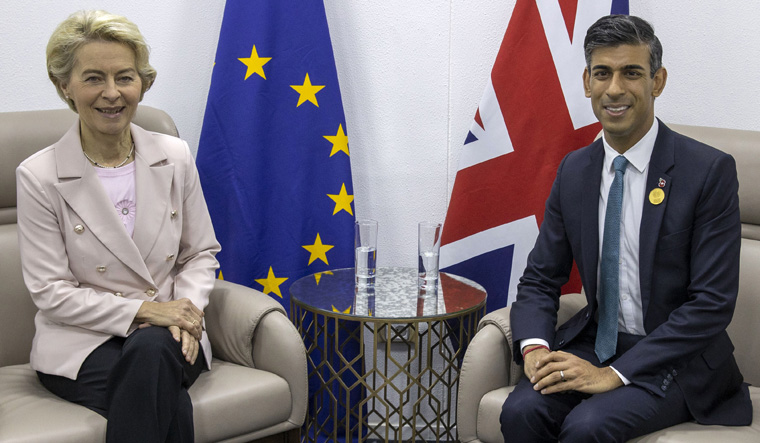UK Prime Minister Rishi Sunak and European Commission President Ursula von der Leyen are set to meet today to settle issues regarding the Northern Ireland protocol and unveil the new protocol today.
The European Commission Chief is also expected to meet King Charles III at Windsor Castle today.
The UK and the European Union were poised Monday to end years of wrangling and seal a deal to resolve their thorny post-Brexit trade dispute over Northern Ireland.
Striking an agreement at a meeting with European Commission President Ursula von der Leyen would be a victory for Prime Minister Rishi Sunak but not the end of his troubles. Selling the deal to his own Conservative Party and its Northern Ireland allies may be a tougher struggle.
Sign of a potential UK-EU breakthrough came Sunday, when the two sides announced that von der Leyen will travel to England for a meeting with Sunak. A joint news conference is pencilled in, followed by a statement by Sunak to the House of Commons.
If all goes to plan, it could end a dispute that has soured UK-EU relations, sparked the collapse of the Belfast-based regional government and shaken Northern Ireland's decades-old peace process.
Northern Ireland is the only part of the UK that shares a border with an EU member, the Republic of Ireland. When the UK left the bloc in 2020, the two sides agreed to keep the Irish border free of customs posts and other checks because an open border is a key pillar of Northern Ireland's peace process.
Instead, there are checks on some goods entering Northern Ireland from the rest of the UK. That angered British unionist politicians in Belfast, who say the new trade border in the Irish Sea undermines Northern Ireland's place in the United Kingdom.
The Democratic Unionist Party collapsed Northern Ireland's Protestant-Catholic power-sharing government a year ago in protest and has refused to return until the rules are scrapped or substantially rewritten.
The DUP has stayed largely silent in recent days, saying it needs to see the details of a deal before deciding whether it meets the party's self-imposed tests.
Hints of compromise towards the EU also have sparked opposition from hard-line euroskeptics who form a powerful bloc in Sunak's governing Conservative Party. Critics include former Prime Minister Boris Johnson, who as leader at the time of Brexit signed off on the trade rules that he now derides. Johnson was ousted by the Conservatives last year over ethics scandals but is widely believed to hope for a comeback.
Jacob Rees-Mogg, a prominent pro-Brexit Tory lawmaker, said acceptance of any deal will all depend on the DUP. If the DUP are against it, I think there will be quite a significant number of Conservatives who are unhappy.
Sunak has said Parliament will get to debate any deal he strikes, but he hasn't promised lawmakers a binding vote on it.
Relations between the UK and the EU, severely tested during the long Brexit divorce, chilled still further amid disputes over the Northern Ireland Protocol. The UK government introduced a bill that would let it unilaterally rip up parts of the Brexit agreement, a move the EU called illegal. The bloc accused the UK of failing to honour the legally binding treaty it had signed.
The mood between London and Brussels improved after Sunak, a pragmatic Brexit supporter, took office in October, replacing more belligerent predecessors Johnson and Liz Truss.
A deal is likely to remove customs checks on the vast majority of goods moving between the UK and Northern Ireland and to give Northern Ireland lawmakers some say over EU rules that apply there as part of the Protocol.
The thorniest issue is the role of the European Court of Justice in resolving any disputes that arise over the rules. The UK and the EU agreed in their Brexit divorce deal to give the European court that authority. But the DUP and Conservative Brexiteers insist the court must have no jurisdiction in UK matters.
(With PTI inputs.)




